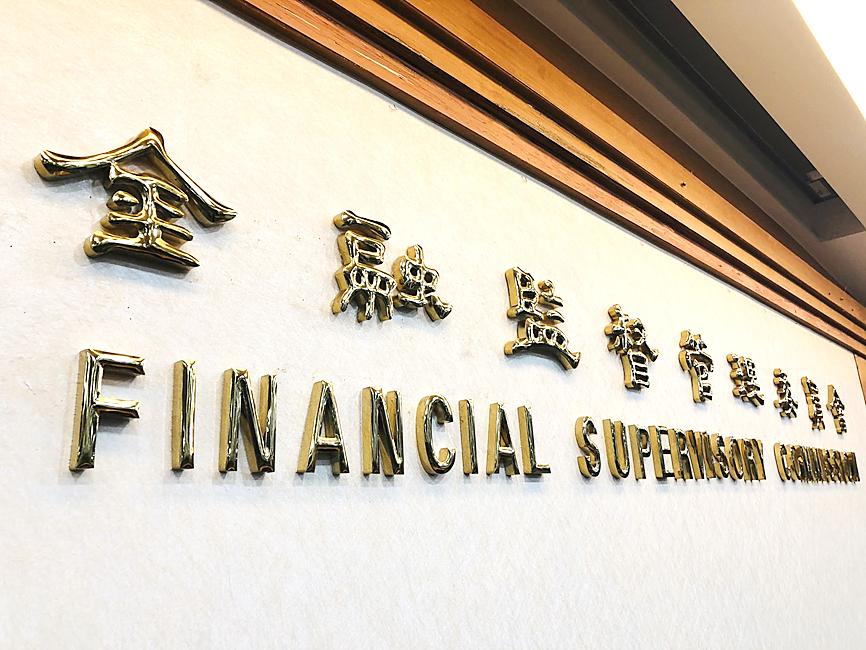The Financial Supervisory Commission (FSC) yesterday said it would lower the application thresholds for employment gold cards, in a bid to attract foreign professionals with top financial certifications, senior-level executives at financial companies or those who have worked in financial technology or e-commerce.
The employment gold card is a four-in-one work permit, residence visa, Alien Resident Certificate and re-entry permit, applicable to foreign professionals in eight fields: science and technology, economics, education, culture, arts, sports, finance and architecture, according to the National Immigration Agency.
The FSC, which is responsible for setting the qualifications for foreign professionals with financial expertise, said it would relax the Requirements and Determination Principles for Foreign Special Professionals with Financial Expertise (外國特定專業人才具有金融領域特殊專長之資格條件及認定原則) to attract more financial experts.

Photo: Kelson Wang, Taipei Times
Foreigners who hold top financial certifications such as chartered financial analyst, certified financial planner or financial risk manager, and have served at managerial posts at local or overseas financial institutions for at least three years — instead of the current five — would be able to apply for the gold cards, the commission said in a statement.
Foreigners who have served in top-level positions, such as chairperson, president, board member or senior management at a local or foreign financial company for more than five years, instead of the previous requirement of 10 years, would be eligible, the commission said.
The former group refers to those who possess special expertise and serve at positions that are not easily replaceable, such as actuaries, so they do not need many years of experience to qualify as professionals, while it should not be difficult for people in the latter group, or heads of international companies, to accumulate five years of experience, an FSC official surnamed Huang (黃) said by telephone.
“With the nation’s capital market and financial industry becoming more international, it is important for us to encourage foreign special talent to join the team,” Huang said.
Foreigners who have never worked in the financial industry could also apply for a gold card if they have worked in the fields of fintech, e-commerce, digital economy, technology or renewable energy for more than three years, down from the current five-year requirement, the commission said.
They do not need to have worked in finance-related positions, but their work content or contribution should be relevant to finance, Huang said.
While the commission opened the channel in 2018, not many foreigners have applied for gold cards through it, he said.
However, with local financial firms focusing on fintech or collaboration with other industries, more experts in fintech, technology or e-commerce are expected to apply for gold cards, Huang said.
The draft amendments are to take effect by the end of this month at the earliest, it said.
A total of 69 foreign professionals with financial expertise received gold cards in the first 11 months of this year, up from 11 for the whole of 2018 and 34 for last year, it added.

A magnitude 5.6 earthquake struck off the coast of Yilan County at 12:37pm today, with clear shaking felt across much of northern Taiwan. There were no immediate reports of damage. The epicenter of the quake was 16.9km east-southeast of Yilan County Hall offshore at a depth of 66.8km, Central Weather Administration (CWA) data showed. The maximum intensity registered at a 4 in Yilan County’s Nanao Township (南澳) on Taiwan’s seven-tier scale. Other parts of Yilan, as well as certain areas of Hualien County, Taipei, New Taipei City, Taoyuan, Hsinchu County, Taichung and Miaoli County, recorded intensities of 3. Residents of Yilan County and Taipei received

Taiwan has secured another breakthrough in fruit exports, with jujubes, dragon fruit and lychees approved for shipment to the EU, the Ministry of Agriculture said yesterday. The Animal and Plant Health Inspection Agency on Thursday received formal notification of the approval from the EU, the ministry said, adding that the decision was expected to expand Taiwanese fruit producers’ access to high-end European markets. Taiwan exported 126 tonnes of lychees last year, valued at US$1.48 million, with Japan accounting for 102 tonnes. Other export destinations included New Zealand, Hong Kong, the US and Australia, ministry data showed. Jujube exports totaled 103 tonnes, valued at

BIG SPENDERS: Foreign investors bought the most Taiwan equities since 2005, signaling confidence that an AI boom would continue to benefit chipmakers Taiwan Semiconductor Manufacturing Co’s (TSMC, 台積電) market capitalization swelled to US$2 trillion for the first time following a 4.25 percent rally in its American depositary receipts (ADR) overnight, putting the world’s biggest contract chipmaker sixth on the list of the world’s biggest companies by market capitalization, just behind Amazon.com Inc. The site CompaniesMarketcap.com ranked TSMC ahead of Saudi Aramco and Meta Platforms Inc. The Taiwanese company’s ADRs on Tuesday surged to US$385.75 on the New York Stock Exchange, as strong demand for artificial intelligence (AI) applications led to chip supply constraints and boost revenue growth to record-breaking levels. Each TSMC ADR represents

TRUST: The KMT said it respected the US’ timing and considerations, and hoped it would continue to honor its commitments to helping Taiwan bolster its defenses and deterrence US President Donald Trump is delaying a multibillion-dollar arms sale to Taiwan to ensure his visit to Beijing is successful, a New York Times report said. The weapons sales package has stalled in the US Department of State, the report said, citing US officials it did not identify. The White House has told agencies not to push forward ahead of Trump’s meeting with Chinese President Xi Jinping (習近平), it said. The two last month held a phone call to discuss trade and geopolitical flashpoints ahead of the summit. Xi raised the Taiwan issue and urged the US to handle arms sales to